List of Bends Knots
How to Tie Rope Bends | Rope Bends
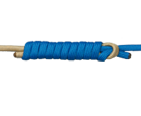
Albright Knot: The Albright Knot is used to join monofilament lines of different sizes. It is often used, for example, to join the fly line to the fly-reel backing line.
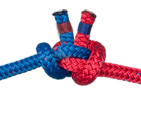
Alpine Butterfly Bend: The Alpine Butterfly Bend provides a secure method of joining two pieces of rope. It is based on the better known Alpine Butterfly Loop. This page provides links to three other very closely related bends: Ashley, Hunter's, and Zeppelin.
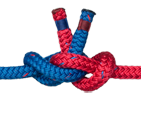
Ashley Bend: The Ashley Bend is tied using two interlocking overhand knots. It provides a secure method of joining two ropes together.
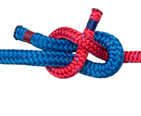
Sheet Bend (Becket Bend): The Sheet Bend joins two ropes of unequal size but also works well if the ropes are of the same size. It has to be tied with both ends loose in your hands with no load on the ropes.
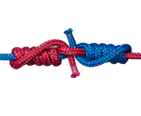
Blood Knot: The Blood Knot is used to join two fishing lines of similar size.
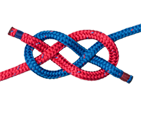
Carrick Bend: The Carrick Bend joins two ropes securely and can readily be untied - even after a heavy load. It is recommended when joining two large tow-line hawsers. The knot deserves to be better known and more widely used.
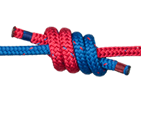
Double Fisherman's or Grapevine Bend: The Double Fisherman's provides a secure method for joining two ropes of similar size. The knot is relatively compact and therefore better than some alternatives when retrieving a climbing rope.
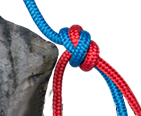
Flat Overhand Knot: The Flat Overhand Knot (aka The European Death Knot) joins to climbing ropes and reduces the risk that they will catch during rappelling.
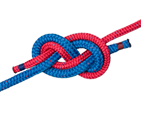
Figure 8, or Flemish, Bend or Join: The Figure 8 Rope Join provides a secure, simple method for joining two ropes together. It is used in climbing, is fairly easy to undo, but creates a relatively bulky knot.
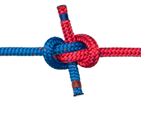
Hunter's Bend: Hunter's Bend is one of a family of knots based on interlocking overhand knots. It joins two ropes of roughly the same size.
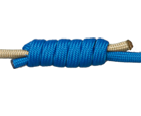
Nail Knot: The Nail Knot is used to join two fishing lines of different diameter. It is used to join a leader, or tippet, to the fly line.
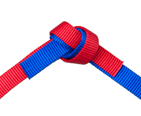
Water Knot: The Water Knot is used to join two pieces of webbing strapping. The wide area of contact between the two straps ensures a secure knot.
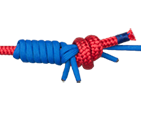
Slim Beauty: The Slim Beauty provides a strong connection between lines of different sizes and materials, e.g., between a fishing line and a large leader.
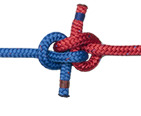
Zeppelin Bend The Zeppelin Bend is one of a family of knots based on interlocking overhand knots. It joins two ropes of roughly the same size.
a Page of Bends (Rope Joins)
This page shows a selection of Bends commonly used to join Lines. Four of the knots are specifically used to join fishing lines: Albright Knot, Blood Knot, Nail Knot, and the Slim Beauty.
The other bends are used to join ropes.
Make a selection from the images above.
